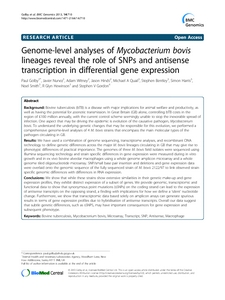Golby, P; Nunez, J; Witney, A; Hinds, J; Quail, MA; Bentley, S; Harris, S; Smith, N; Hewinson, RG; Gordon, SV
(2013)
Genome-level analyses of Mycobacterium bovis lineages reveal the role of SNPs and antisense transcription in differential gene expression.
BMC GENOMICS, 14 (710).
ISSN 1471-2164
https://doi.org/10.1186/1471-2164-14-710
SGUL Authors: Hinds, Jason Witney, Adam Austin
![[img]](https://openaccess.sgul.ac.uk/104090/1.hassmallThumbnailVersion/1471-2164-14-710.pdf)  Preview |
|
["document_typename_application/pdf; charset=binary" not defined]
Published Version
Download (1MB)
| Preview
|
Abstract
Background: Bovine tuberculosis (bTB) is a disease with major implications for animal welfare and productivity, as
well as having the potential for zoonotic transmission. In Great Britain (GB) alone, controlling bTB costs in the
region of £100 million annually, with the current control scheme seemingly unable to stop the inexorable spread of
infection. One aspect that may be driving the epidemic is evolution of the causative pathogen,Mycobacterium bovis. To understand the underlying genetic changes that may be responsible for this evolution, we performed a omprehensive genome-level analyses of 4 M. bovis strains that encompass the main molecular types of the pathogen circulating in GB.
Results: We have used a combination of genome sequencing, transcriptome analyses, and recombinant DNA
technology to define genetic differences across the major
M. bovis lineages circulating in GB that may give rise to
phenotypic differences of practical importance. The genomes of three M. bovis field isolates were sequenced using
Illumina sequencing technology and strain specific differences in gene expression were measured during in vitro
growth and in ex vivo bovine alveolar macrophages using a whole genome amplicon microarray and a whole
genome tiled oligonucleotide microarray. SNP/small base pair insertion and deletions and gene expression data
were overlaid onto the genomic sequence of the fully sequenced strain of M. bovis 2122/97 to link observed strain
specific genomic differences with differences in RNA expression.
Conclusions: We show that while these strains show extensive similarities in their genetic make-up and gene
expression profiles, they exhibit distinct expression of a subset of genes. We provide genomic, transcriptomic and
functional data to show that synonymous point mutations (sSNPs) on the coding strand can lead to the expression
of antisense transcripts on the opposing strand, a finding with implications for how we define a ‘silent’nucleotide
change. Furthermore, we show that transcriptomic data based solely on amplicon arrays can generate spurious
results in terms of gene expression profiles due to hybridisation of antisense transcripts. Overall our data suggest that subtle genetic differences, such as sSNPS, may have important consequences for gene expression and
subsequent phenotype.
| Item Type: |
Article
|
| Additional Information: |
© 2013 Golby et al.; licensee BioMed Central Ltd. This is an open access article distributed under the terms of the Creative Commons Attribution License http://creativecommons.org/licenses/by/2.0), which permits unrestricted use,distribution, and reproduction in any medium, provided the original work is properly cited. |
| Keywords: |
Science & Technology, Life Sciences & Biomedicine, Biotechnology & Applied Microbiology, Genetics & Heredity, Bovine tuberculosis, Microarray, Mycobacterium bovis, Transcript, SNP, Antisense, Macrophage, MESSENGER-RNA STABILITY, TUBERCULOSIS COMPLEX, ANTITOXIN, IDENTIFICATION, PATHOGENICITY, METABOLISM, EVOLUTION, BACTERIA, STRAIN |
| SGUL Research Institute / Research Centre: |
Academic Structure > Infection and Immunity Research Institute (INII) |
| Journal or Publication Title: |
BMC GENOMICS |
| ISSN: |
1471-2164 |
| Related URLs: |
|
| Dates: |
| Date | Event |
|---|
| 17 October 2013 | Published |
|
| Web of Science ID: |
WOS:000326178300002 |
  |
Download EPMC Full text (PDF)
|
 |
Download EPMC Full text (HTML)
|
| URI: |
https://openaccess.sgul.ac.uk/id/eprint/104090 |
| Publisher's version: |
https://doi.org/10.1186/1471-2164-14-710 |
Statistics
Item downloaded times since 25 Mar 2014.
Actions (login required)
 |
Edit Item |



